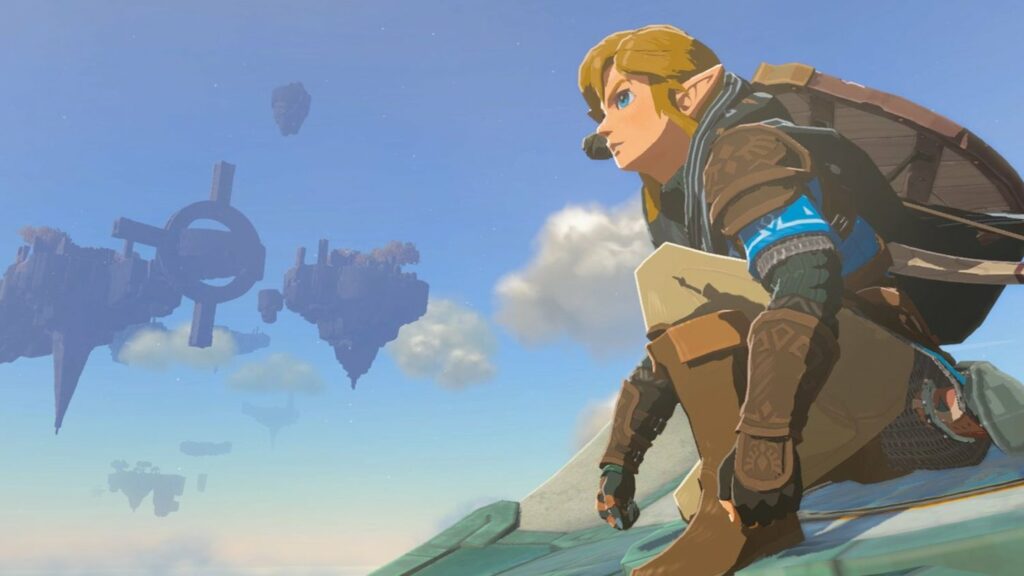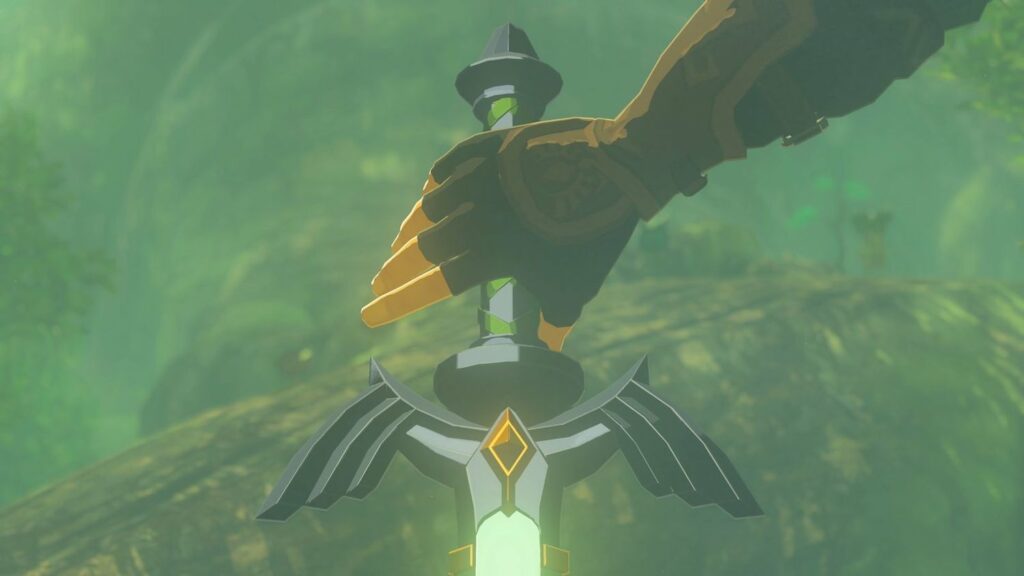Hi Everyone. Welcome to another issue of Naavik Digest! If you missed our last one, be sure to check out our dive into the future of Ubisoft as the French publisher tries to diversify its gaming portfolio. This issue, we’re discussing the stunning success of The Legend of Zelda: Tears of the Kingdom and how Nintendo’s repeat masterpiece provides valuable lessons.
Amazon’s New MMO / Google Shows Off AI / Cross Platform Gaming Data

How did Zelda outsell Harry Potter? Why is Amazon trying another Lord of the Rings MMO? Google shows off new AI tech.Cross-platform gaming shows some interesting trends. Join us for all the latest games business news with Maria Gillies, Dave Elton, Sebastian Park, and host Devin Becker.
You can find us on YouTube, Spotify, Apple Podcasts, Google Podcasts, YouTube, our website, or anywhere else you listen to podcasts. Also, remember to shoot us any questions here.
#1: The Key Takeaways From Tears Of The Kingdom
Written by Nick Statt, Naavik Managing Editor

The Legend of Zelda: Tears of the Kingdom has been out for a little over a week, and it’s safe to say it’s engulfed the game industry. Within three days, TotK sold more than 10 million copies, making it the best-ever launch in franchise history and the second-fastest-selling Nintendo game behind only Pokémon Scarlet and Violet, which had two separate product SKUs going for it.
It’s hard to understate how much of a critical achievement TotK is. The game holds the highest-ever score on review aggregator OpenCritic with a 97 average. Many critics have hailed it as even better than its predecessor thanks to the depth of its item fusing and crafting systems on top of the astonishing level of polish to the game’s open world, puzzle design, and nonlinear narrative.
It’s worth it at times like these to try and make a clear-eyed assessment of how games like TotK do what they do and why they tend to resonate so well with players. Because, as was the case with Elden Ring, it’s not the visual fidelity of the experience or the realism of the world, though I do think Nintendo has pulled off some programming wizardry to have a game of this scope and complexity running on what might as well be decade-old hardware at this point. Rather, TotK does what every great game does and what so many Zelda titles have done before it: it makes you think, and then it rewards you accordingly. And those rewards can feel that much sweeter when you think outside the box, which TotK encourages to mind-blowing lengths.
“We wanted to kind of put players’ imaginations to work — to get you thinking proactively from your own end about what might be possible,” longtime Zelda producer Eiji Aonuma told The Verge in an interview. “We’re hoping that people will have that creative thinking process over and over again as they play through the game, and maybe even that they will carry that kind of thinking — that creativity and expanded imagination — into their real lives.”
In that spirit, let’s discuss what elements of TotK extend beyond the game, and how those learnings can be applied to future projects.

What We Should Take Away From Tears Of The Kingdom
TotK has a wealth of timeless game development wisdom seeping from its every pore, but of course it’s not as simple as just telling developers to go make a nonlinear open world game with a crafting system. “Just copy Breath of the Wild” was neither a viable strategy nor sound advice back in 2017, and the same is true with the sequel today.
Instead, it’s important to keep in mind what Tears of the Kingdom does do well and why it shines beyond its significance as a Zelda game or even an open world one for that matter. What Aonuma, game director Hidemaro Fujibayashi, and the Zelda team achieved goes far beyond franchise and genre trappings to the more universal themes of play. Let’s jump in.
Simplicity is King: Like Breath of the Wild before it, TotK doesn’t overthink its open world system design and doesn’t force the player to learn confusing, cumbersome processes or tools.
- Your main inventory is simple and virtually unlimited, while your weapon one is not. Cooking can be done in an instant using just five ingredients, while armor is just three articles of clothing with combined effects and defense ratings.
- Fast travel is unlocked almost immediately, and the game does not tell you where you can’t go or what you can’t do. While non-linear narrative design doesn’t work in every context, used in the right way it can give players an unmatched sense of freedom and dispel any concern of playing the game the “wrong way.”
- The new crafting system is build around an extremely straightforward and astonishingly powerful new ability, Ultrahand, that lets you manipulate objects and combine them. The beauty of Ultrahand is how few rules restrict how it can be used.
Give Players “Aha” Moments: Zelda has always been about the act of discovery, whether it’s stumbling upon a new dungeon for the first time or deciphering the solution to a puzzle and hearing the iconic sound of a treasure chest opening.
- TotK bakes the act of discovery into every inch of its world, making the act of exploring and puzzle-solving feel like a never-ending dopamine rush in much the same way navigating the Lands Between in Elden Ring felt.
- Many of the game’s abilities outside Ultrahand — from the time-rewinding Recall to the matter-permeating Ascend — practically beg the player to try and break the game with them, resulting in moments of true revelation when you achieve a desired goal in an unconventional way. And in fact, a common sentiment from players is that the Zelda team seems to have been inspired by many of the glitches and speedrunning tactics the community began deploying in BotW when designing these new systems.
- This style of design, which some have called emergent gameplay or “multiplicative gameplay” as Fujibayashi calls it, gets at the core of what can make bending and breaking the rules so fun.
- When there’s little to no direction, players are free to let their creativity expand endlessly, and a game that creates the playground for such experimentation is justifiably a groundbreaking experience.
Let Players Express Themselves: An under-appreciated element of both BotW and now its sequel is how much customization and unique expression the game allows in addition to the level of freedom it gives players to choose their own path.
- Unlike its predecessor, TotK has included dozens of optional amiibo-related outfit options, weapons, and other items you can now collect in-game to pad the already-extensive endgame content. The developers even went out of their way to include a fashion hub at Hateno Village to lean harder into the aesthetic side of TotK’s role-playing elements.
- Because pretty much every obstacle in the game has multiple solutions, players can develop personal styles of puzzle-solving they’re fond of.
- Perhaps you like figuring out how to use hot air balloons to skydive into seemingly inaccessible locations instead of climbing your way there. Or maybe you like building the world’s longest bridge out of tree trunks to cross large gaps. Or perhaps, like some crafty TotK players, you like buiilding mech suits, multi-stage rockets, and even an orbital laser cannon.
Graphics Don’t Matter (Unless You Say They Do): Players will judge a game based on the expectations set for it, and nobody goes into a Switch game or a new Zelda for that matter hoping for cutting-edge visuals.
- The game still has a fantastic art style, but it’s fair to say performance on the Switch is sluggish at times. But it doesn’t matter. A very small minority of players might not play a new Zelda game because it has subpar visuals or doesn’t run at 60fps, but the overwhelmingly majority do not care so long as the gameplay is strong.
- Some people have drawn comparisons between the collective shrug toward TotK’s graphics and performance compared to the outrage flung at the developers of Star Wars Jedi: Survivor and Redfall. The difference is obvious: those games are billed as state-of-the-art visual experiences running on the most performant hardware. When such products don’t deliver, consumers get upset.
- A new Switch is surely on the way, and with it we can imagine improved visuals and frame rate capabiltiies. But what we should take away from the early success of the TotK is that boundary-pushing game design, creativity, and fun factor are paramount and can make even the most rudimentary-looking game feel like breath of fresh air.
#2: Overwatch 2’s Plight, The CMA’s Determination & Single-Player Gaming Milestones

Overwatch 2’s PvE ambitions are no more. Blizzard this week delivered Overwatch fans some bad news: the much-anticipated PvE mode for Overwatch 2 would not in fact arrive in its originally promised form. In what was shaping up to be an inevitability given the lack of communication about the mode — which last year did not arrive at launch — the studio said the effort required to deliver on the original vision for PvE was “huge” with no “end in sight.” Executive Producer Jared Neuss didn’t mince words: “Development on the PvE experience really hasn’t made the progress we would have hoped.” In place of the hero skill trees and long-term progression system, Blizzard said it will simply incorporate co-op experiences into its season roadmap, not unlike the case with the original Overwatch. As for why the studio went through the whole transition to Overwatch 2 in the first place, it’s not really clear anymore. While the game can still be considered a financial success thanks to its free-to-play monetization changes, Blizzard’s major fumble here is a true disservice to Overwatch fans who waited for years for a proper reboot of the franchise.
The CMA is undeterred. This past week, Microsoft was handed a much-needed victory in its quest to acquire Activision Blizzard when the European Union’s regulatory body gave the deal the go-ahead. In approving the merger, the EU now stands in contrast with the U.K.’s Competition and Markets Authority, which shocked the industry last month when it struck the deal down over anticompetitive concerns for the nascent cloud gaming market. Microsoft still has an uphill battle, including an appeal with the CMA and an ongoing legal tussle in the U.S. with the Federal Trade Commission. Not to mention the CMA seemed rather unfazed by the EU decision, saying in a statement that EU regulators were “fully entitled to reach that view” but that “we remain of the view, from a U.K. perspective, that it was not appropriate to accept that remedy." The CMA even went a step further last week, ahead of the EU verdict’s release, when it imposed a blanket ban on any investment between Microsoft and Activision Blizzard as a to try and way to circumvent the blocked merger. As it stands, the CMA wants this deal dead, and it appears willing to do whatever it takes to secure the kill.
Single-player games continue to shine. In case you needed any more evidence that single-player gamers are far from losing their relevance within the broader gaming sphere, look no further than Nintendo’s The Legend of Zelda: Tears of the Kingdom, which sold more than 10 million copies in its first three days. It’s an astounding result for an exclusive first-party game, let alone one more than seven years into a console’s life cycle, and it’s topped only by last year’s similarly impressive opening sales weekend for Pokémon Scarlet and Violet. While it may not quite top Rockstar’s GTA V, which sold $1 billion in its first three days back in 2013, Tears of the Kingdom is just the latest in a line of record-breaking single-player hits, from Cyberpunk 2077’s 13.7 million in three weeks, and both Elden Ring and Hogwarts Legacy’s 12 million milestones in just two weeks. While few franchises carry the cultural weight of Zelda, TotK’s performance is still a reminder that there’s a healthy appetite for meaty, solo experiences and even more so as gaming continues to expand its audience.
In Other News…
💸 Funding & Acquisitions:
- Super League acquired metaverse experience developer Melon. Link
- Keywords acquired Fortnite support studio Hardsuit Labs. Link
- Epic Games purchased a stake in metaverse clothing firm CLO Virtual Fashion. Link
📊 Business:
- European Commission approved the Microsoft-Activision Blizzard deal. Link
- Tears of the Kingdom sold 10 million copies in just three days. Link
- PlayStation-backed Deviation Games was hit with layoffs. Link
- Witcher spinoff studio is rebooting the project and laying off some staff. Link
🕹 Culture & Games:
- Riot Games got final approval on its gender discrimination settlement. Link
- Overwatch 2 PvE Hero Mode was canceled. Link
- Ubisoft is investing even more into Assassin’s Creed. Link
- Roblox ads come under fire from the Children’s Advertising Review Unit. Link
👾 Miscellaneous Musings:
- Tape to Tape: How an indie sports title generated amazing sales. Link
- Leadership in games: solving the human puzzle genre. Link
- HowToMarketAGame’s Chris Zukowski’s on launching indies against AAA. Link
🔥Featured Jobs
- Esports Insider: Digital Marketing Manager (London, U.K. / Remote)
- MY.GAMES: Production Director (Remote)
You can view our entire job board — all of the open roles, as well as the ability to post new roles — below. We've made the job board free for a limited period, so as to help the industry during this period of layoffs. Every job post garners ~50K impressions over the 45-day time period.








